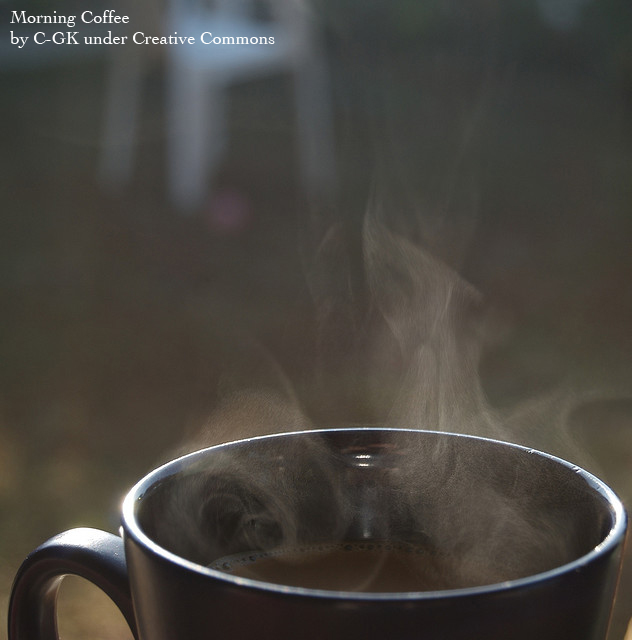Tag Archives: sleep
Things We Like: Sleeping Comfortably On A Hot Night

Post by Kyle St. Romain.
With summer winding down, many of us are looking forward to everything that fall brings. One of the things about fall that I most look forward to is the cooler weather. Here in California, the weather is quite pleasant year round; however, September usually brings a couple weeks of almost unbearable heat (relatively speaking). And while the September heat is perfect for getting in a few finals days at the beach, living without air conditioning it can be most unpleasant for sleeping. If only we had a sleeping porch to take in the cool night air. Sigh.
For those of you who are likewise trying to beat the heat without the help of AC, I’ve put together a list of helpful tips and tricks to stay cool while you sleep. Even if you do have air conditioning, you can use these tricks to save a bit on your electricity bill without sacrificing too much in the way of comfort.
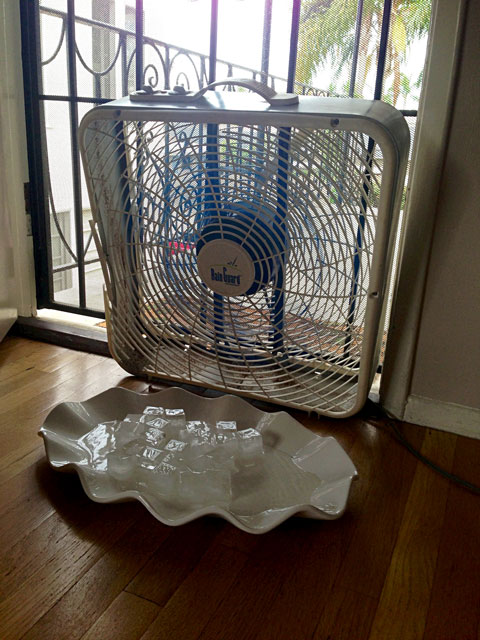
1. Use Fans and Ice To Circulate Cool Air
Fans have been our saving grace the past couple weeks. Ceiling fans, air filters, and box fans are all great to keep the air moving inside the house, but you may need to take more drastic measures to pull cool air into your home — especially at night. We’ve been leaving box fans on by the screen door (locked of course) and windows at night to get the most out of the cooler nights. It’s not perfect, but it helps.
On really hot days we even put a shallow tray of ice cubes in front of the fans to chill the air even more. While it’s no substitute for air conditioning, every bit of cool air helps. Did you see the Great Gatsby? The ole’ ice-in-front-of-the-fan-trick seems to be a long time favorite for staying cool. Be careful though, dogs like ice. And if you share your home with a four-legged friend, you may later discover a puddle of melted ice somewhere in your living room. Don’t be mad though, they’re just trying to stay cool too!
2. Pull the sheets back
Even the most breathable cotton sheets can trap hot air and make you uncomfortable in bed. If this is the case, try peeling the sheets back from your torso so they just cover your lower half. Alternatively, you can sleep with one leg (or your whole body) on top of the sheets. Again, not ideal but it helps.
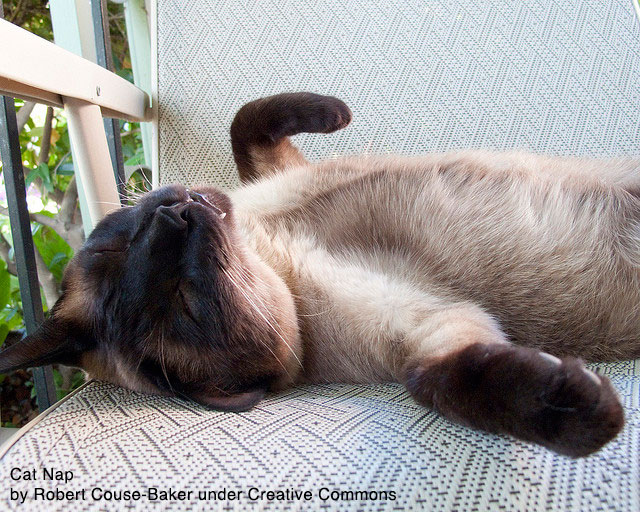
3. Take A Cold Shower Before Bed
If your body is feeling stubborn and won’t cool down, a cold shower will feel great. And instead of drying off quickly with a towel, try air-drying for a bit. As the cool water evaporates, it will take a little extra heat off your skin with it.
4. Put Some Cold Towels On The Back Your Neck
A lot of blood flows through your neck, and placing a cold towel on the back of your neck can help you feel cooler quickly. This trick takes a bit of planning, as you’ll need to put a couple damp rags in the freezer for at least a couple hours before you need them. Your body also exchanges a great deal of heat through the hands and feet, and cold socks can likewise be used to help you cool down.
Thankfully, cooler weather is just around the corner. Until then, the above tricks should help out.
Things We Like: Ten Habits To Help You Sleep Better
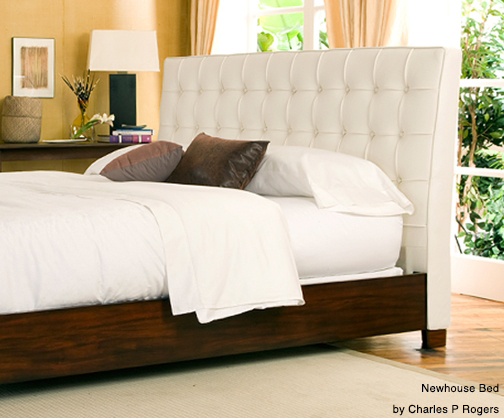
Post by Kyle St. Romain.
Sleep is one of those unavoidable, mission critical facets of life that we cannot avoid. However, many people treat sleep as a mere inconvenience, and spend their whole lives trying to shortcut the process. Whether your bad relationship with sleep is intentional or otherwise, improving your sleep is one thing you have complete control over that can make one of the biggest impacts on your quality of life.
To help get you on your way (or remind you of what you already know), we’ve put together a list of ten habits to help you sleep better.
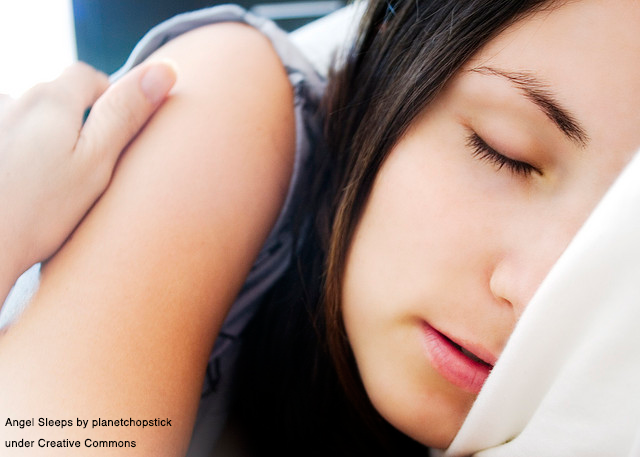
5 things to do for better sleep
- Exercise
Exercise is a great way to use up excess energy. In addition to helping you sleep better, exercising is good for your overall health. Instead of worrying about the time of day you exercise or making excuses, just get out there and do it.
2. Eat Healthy
Cut out the fast food and freezer dinners, and reach for fruits and vegetables. It may take some time to notice the change, but eating healthy will not only help you sleep better; it will help you feel better and more energized throughout the rest of your day.
3. Stay Hydrated
The human body is mostly water, and needs to stay hydrated. While the amount of water you need to drink depends on the individual, chances are you aren’t drinking enough. If you’re thirsty, it means you’re dehydrated. Drink enough water throughout the day to where your body doesn’t have to tell you it needs more.
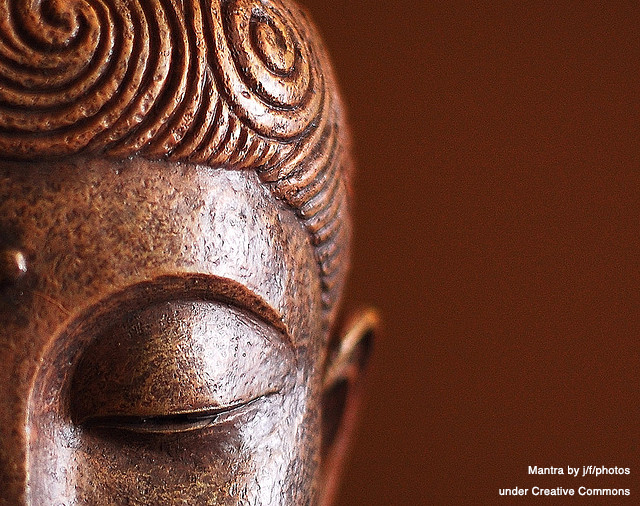 4. Meditate
4. Meditate
Meditation helps put your mind at ease before falling asleep. I’ve been getting back into it the past couple weeks, and it’s helped a lot. If you’re just beginning, try focusing on your breaths: count one each time you inhale, and when you get to 10 count back down each time you exhale. I usually don’t even make it back down to zero before dozing off.
5. Establish a routine, and stick to it
People are creatures of habit, and one of the best ways to sleep better is to make it a routine. If you wake up for work at the same time every day, then you know what time you need to go to sleep to get enough of it. Many people who establish a sleeping routine don’t even need an alarm clock after a while. Instead, their bodies have learned what to expect and the mind serves as its own clock.
5 things to avoid for better sleep
1. Stay Away From Big Meals Before Bed
While a light snack (peanut butter on celery sticks) can actually help you sleep better through the night, a large meal will not. If you eat a lot before bed, your body will continue to digest the food while you’re trying to sleep. It’s a tug of war that you’re never going to win. Instead, try to eat dinner a couple hours before going to bed to make sure you’re body has had enough time to digest.
2. Avoid caffeine, alcohol, and excessive liquids before bed
Caffeine and alcohol are two of the prime culprits of a bad night’s sleep, though too much water before bed can also wake you from your slumber in search of a bathroom. Caffeine can affect you up to 12 hours after drinking it, so you may even need to cut back on lunchtime coffees. And while alcohol may seem like it helps you fall asleep, it actually causes midnight restlessness.
3. Turn Off The Lights
You need to make sure your bedroom is as dark as possible. One obvious change would be to turn off the lights or television set before you go to bed. If you’ve turned everything off and your room is still brighter than you’d like, consider investing in some blackout curtains. You’ll never be able to reach your full sleep potential in a bright room.
4. Don’t oversleep
Oversleeping can be as bad for your health as not sleeping enough. The average adult needs around 8 hours of sleep, and can vary by a couple hours depending on the individual. In addition to heart disease, depression, and diabetes, oversleeping will leave you feeling more tired when you wake up than you did before.
5. Don’t sleep in an uncomfortable bed
If you don’t have a comfortable bed, then you won’t ever look forward to using it. If you wake up with a sore neck or stiff back in the morning, it may be time in invest in a new mattress or some new pillows. If you’re too hot at night, you can turn down the air conditioning, turn on a fan, or try some new cotton sheets that breathe better. The bottom line is that an uncomfortable bed will ruin what would otherwise be a great night’s sleep. Start here first.
Remember: When forming new habits or breaking old ones, the trick is to go slow. Instead of trying to change everything at once, focus on one thing at a time. This will help ensure that your new habits stick, and permanently become part of who you are.
Things We Like: Eliminating Electronics For Better Sleep
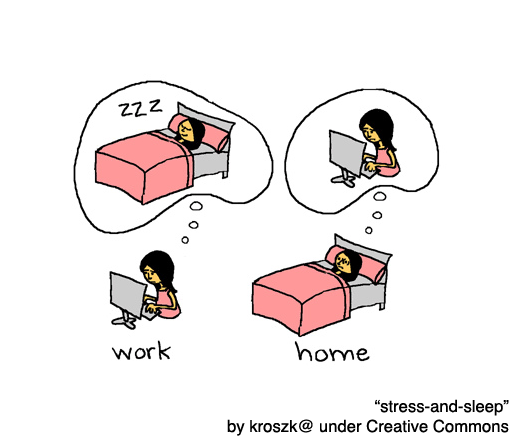
Post by Kyle St. Romain.
This week I’ll introduce you to a sleep tip that many of you are probably aware of, but do not practice: keeping the phone (and other electronics) away from the bed.
I often think, as do a lot of people I meet, that sleeping with the cell phone, tablet, or other electronic device by the bed is bad for sleep. Why? Because, with your phone at an arm’s length away, we are constantly tempted to check our email or read an excessive amount of news before bed—electronics enable the insomniac in all of us. To help reduce the negative consequences of sleeping in an ever-connected, 24/7 world, I’ve put together three steps to help you get the good night’s sleep you’ve been craving.
Step One: Turn The Screen Off
The first way that electronics affect sleep is by exposing us to unnaturally bright light after. Light inhibits the body’s release of melatonin, a hormone that promotes sleep. This is a natural reaction, and is what helps our bodies stay awake during the daytime; however, when you introduce artificial light after the sun has gone down, your body is tricked into thinking it should still be awake. We all have different light sensitivities, and I didn’t notice the effect until I started reading under a full-spectrum light. While it helped with Seasonal Affective Disorder (the winter blues), it kept me wide-awake and alert far past my bedtime—more than any amount of coffee ever could.
I touched on this idea a while back in an article about color shifting your computer screen for better sleep. This little trick not only helps alleviate eyestrain, but it also helps your body prepare for sleep.
To further resolve this problem, try setting an electronics curfew for yourself. All you need to do is have the discipline to cut out your use of electronics 60 to 90 minutes before you go to sleep. Easier said than done, I know.
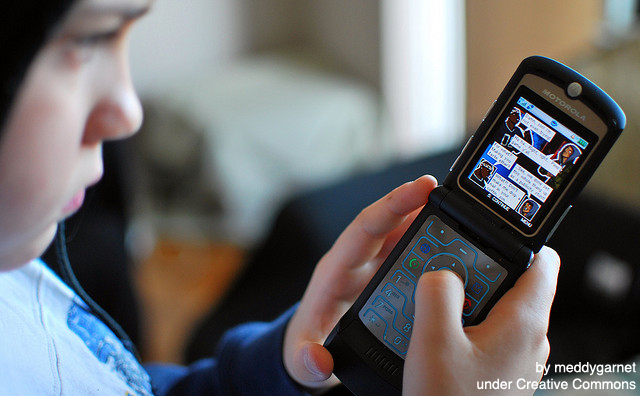
Step Two: Eliminate Distractions
Even if our bodies didn’t respond to bright lights, electronics affect us psychologically with the media they display. Have you ever found yourself unable to sleep after a scary movie? It’s likely due to the adrenaline your body produces in its natural fight-or-flight reaction.
Eliminating stress and anxiety triggers before sleep should help your mind stay calm and collected—an essential ingredient for a good night’s rest. So even if you can’t pry yourself away from watching another episode of your favorite show or reading that last-minute email, save the stressful stuff for the morning.
Step Three: Move Your Electronics Away From The Bed
If you’ve been unable to get that restorative sleep you’ve been aiming for, the problem might be sitting right next to you. And even if you aren’t actively using electronics before bed, they can still disrupt your sleep. Anything electronic produces electromagnetic radiation (EMR), which affects your body’s production of melatonin and serotonin. EMR is also thought to make us more sensitive to the fight-or-flight state, which is otherwise caused by psychological triggers like a scary movie or an upsetting email. This is known as the “wired-and-tired” effect, and is one of the reasons we find ourselves awakening from a long sleep, but still feeling exhausted.
To reduce your exposure to EMR, try moving your electronics as far away from the bed as possible. While it may take a few weeks, or even months to see results, the long-term benefits will be well worth it. After all, there is nothing natural about sleeping next to a cell phone.
Things We Like: The Sound of Sleep
Post by Kyle St. Romain.
What sound do you hear when you think about falling asleep? Is it the sound of your ceiling fan whirring above, or a noisy heater in another room? Maybe it’s car horns, or other noises from the streets below. Whatever comes to mind, chances are it isn’t complete silence. While you may think that complete silence is the best thing to hear when you’re lying in bed right before drift-off, there are a number of studies that show certain sounds help us sleep better; that silence isn’t necessarily golden when you’re asleep.
Even while your asleep, your brain processes sound to varying degrees depending on your own sensitivity and the type of noise perceived. Some people may be able to sleep through a fire alarm, while others will awaken at the sound of a floorboard creaking on the other side of the house. The type of sound can also aid or disrupt sleep depending on whether it is an alarming sound, like a fire alarm, or a relaxing sound, like waves crashing onto the beach.
Since everyone is different, it’s important to find out what type of sounds relax your mind while sleeping and which ones do not. Below, are several different types of noise that people generally find relaxing. You’ll have to experiment a bit to figure out which one works for you, but it can pay off handsomely once you know.

White Noise is created by combining all the available sound frequencies together into one, similar to how white light is the product of all the other colors in the visible spectrum. Since white noise contains all frequencies, it is often used to mask other sounds. A ceiling fan is a good example of white noise that is commonly used as a sleep aid to drown out unwanted noises. There are also white noise generators that can create the “perfect” white noise, and are generally available for listening online.
Nature Sounds are another popular type of noise to fall asleep to. Whether you prefer the sound of rainfall, waves crashing against the shoreline, birds or wind chimes sounding, or crickets chirping in the night, many people find that listening to the sound of nature helps them sleep better. Additionally, you may find that certain sounds are better for blocking out different types of unwanted noise. For example, rainfall is better at blocking out household noises like appliances.
Music has long been a favorite type of noise to fall asleep to, though it may not actually help you sleep as much as it makes you happy to listen to your favorite band. If you’re goal of listening to music before bed is to actually sleep better, then you should consider very down-tempo, “chill” tracks, like the kind of music you would expect to hear at a massage salon.
Silence some people can’t stand the sound of anything when they are falling asleep, and if you’re this type of person then you have a bit of work cut out for you. Sound proof windows, well-insulated walls, and tuned-up in a very remote location are about all that’s going to
When using sound for better it’s important to experiment and figure out which sounds works best for you. If you’re looking for sleep-inducing sounds, try listening to playlists available through Internet radio stations like Pandora, Spotify, or LastFM for inspiration. And, as noted earlier, you may even find that certain sounds help you sleep better for different occasions, like if the neighbors are being loud one night, or you suddenly can’t stop focusing on the sound of the refrigerator.
Things We Like: Getting The Right Amount Of Sleep
Post by Kyle St. Romain.
One thing you’re unlikely to hear someone complaining about is getting too much sleep. In fact, most of us long for sleeping in on the weekends or catching up on some much needed sleep that work, family, and other responsibilities deprive us of. However, sleeping too much or oversleeping can be just as unhealthy as not sleeping enough. The trick to sleep, like many things in life, is balance.
Everyone needs a different amount of sleep, just like different cars need a different amount of gasoline to travel the same distance. The general rule is that you should try to get around eight hours of sleep per day, and most people will fall within one hour of this requirement. Your actual need for sleep depends on the amount of stress your experiencing and how physically active you are, to name a few. If you don’t sleep enough, you accumulate a sleep debt; however if you sleep too much you don’t necessarily accumulate a sleep credit.
Oversleeping, also called hypersomnia, is a serious medical disorder. Symptoms associated with hypersomnia include anxiety, low energy, mental problems, and a constant need for more sleep. Hypersomnia has also been linked to increased risk for diabetes, obesity, headaches, back pain, depression, heart disease, and even death. If you’d like to read more about how hypersomnia increases your health risks, check out this article on oversleeping by WebMD.
The good news is that hypersomnia is a very fixable problem. Sometimes, hypersomnia is brought on by underlying medical conditions, which you’d need to see a doctor for; however, it’s more common that hypersomnia is simply a result of poor sleep hygiene. Below is a list of tips and suggestions to help you regain control over your sleep habits.
1. Establish a regular sleep routine. Humans are creatures of habits, and if you can discipline yourself to go to bed and wake up at the same time every day, getting the right amount of sleep will be easier. It takes about 30 days of doing something or not doing something before it becomes a habit, so it’s important to stick with your sleep routine for at least one month.
2. Plan your day. If you have a plan of attack going into each day, you’ll know exactly how much time you need to get everything done. Having a plan can help you realize that oversleeping is depriving you of doing the things you want during the day.
3. Optimize your wake up routine. It’s important to look forward to getting out of bed in the morning. Since the morning commute likely isn’t a big motivator, think about all the things you love doing before you officially start your day. Set aside some time in the morning especially for yourself. Do you love a fresh, hot cup of coffee in the morning? Do you like to read the newspaper before getting your day started? Maybe you like to take a hot shower with an invigorating body wash. Whatever it is, figure out what makes you happiest in the morning and you may actually look forward to getting out of bed.
4. Avoid alcohol and caffeine before you go to bed. Stimulants and depressants can affect your body’s ability to get a good night’s sleep. If you want to drink something to help you sleep, try a warm glass of milk before bed.
5. Exercise regularly. Exercise is linked to a number of health benefits, including better sleep. Going for a jog, participating in a yoga class, or lifting weights at the gym helps cleanse your body of impurities that build up throughout the day. Exercise also drains any extra energy you may have left over from the day, which can help you fall asleep faster.
The above suggestions are just a couple ways to help you improve your sleep hygiene. If you find that you cannot break yourself of oversleeping, you may also want to consider making an appointment with your doctor.
Do you sleep too much, or not enough? Do you have any morning rituals you can’t live without? Let us know in the comments below.



